Yesalam
Beles Sugar Development Project, Ethiopia
Yesalam belongs to the native Awi group. He used to be a farmer, but when he was resettled because of the Sugar Project he started a new business transporting wood and other goods with a mule cart.
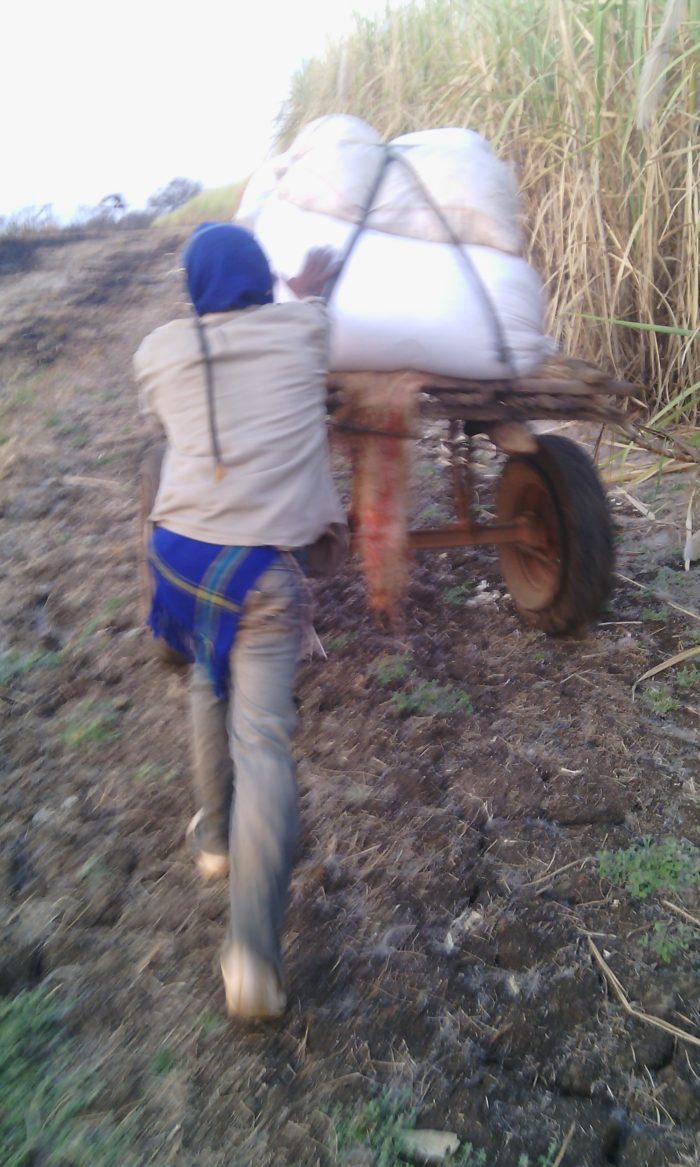
“This is me pushing the cart. I am transporting grain for others. This is my main source of income: from this I earn money to buy food and clothes for my family. We are resettled here because the government said that the land has to be used for sugar development. I have 11 family members. After I was resettled, I also tried to work in Region 6 (Benishangul Gumuz). But I did not earn enough. What I earned was going to the land owner and transportation costs. So I decided to do this job. It also helps me to stay closer to my family. I have been doing this job for three years now. One year I also rented the mule cart with the agreement of sharing in equal parts the money: if the man earned 100 birr, 50 birr was for the man and 50 birr for me. To buy the cart I had to sell two of my oxen. Also because there was no land to keep the cattle.
The cart has been a good improvement. Otherwise I think I would have been working in the Sugar Project, like my brother and sister. The rhythm of my work depends on the condition of the mule. If we go collecting firewood it takes us 7 hours to reach there, so 14 hours in total. I go very early in the morning and I come back after sunset. Then the animal needs to rest. I earn from 180 up to 300 birr per trip. When I am in town, I transport grains: the price is 8-10 birr per quintal and I can earn 110-120 birr per day, when it is a good day. But there are also days where I do not earn any income at all.
My wife helps me by giving water to the mule and giving me breakfast. She takes care of the children and prepares the food. I have five children and she also looks after the two children of my brother.”
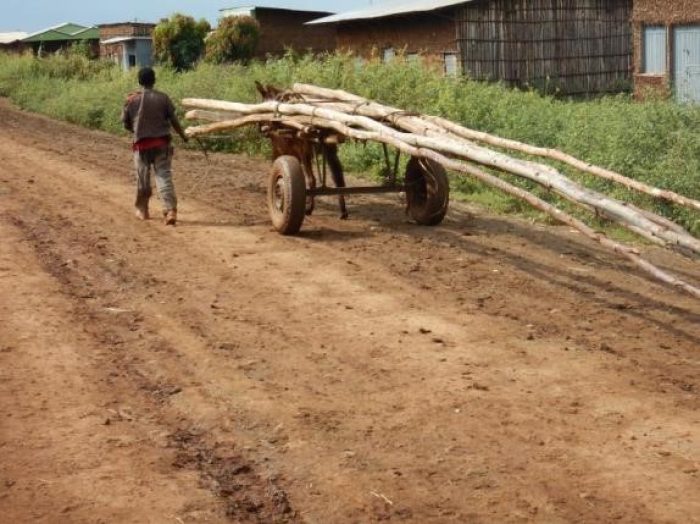
“This is my son. He helps me in collecting woods. He is 11 years old and at school he is in grade six. My two sons and my nephew help me a lot. For me it would not have been possible to work without them. Children request a lot of expenses for clothes or shoes. But they support me with work after school. Life would have been very hard if there were no children to herd the cattle! The kids work only after school and during school breaks. They do not go to far places. My son also brings grass for animal fodder from the sugarcane plantation. He carries the grass on his head. Taking grass from the sugar plantation was forbidden, but after the community complained we have been allowed to do it.”
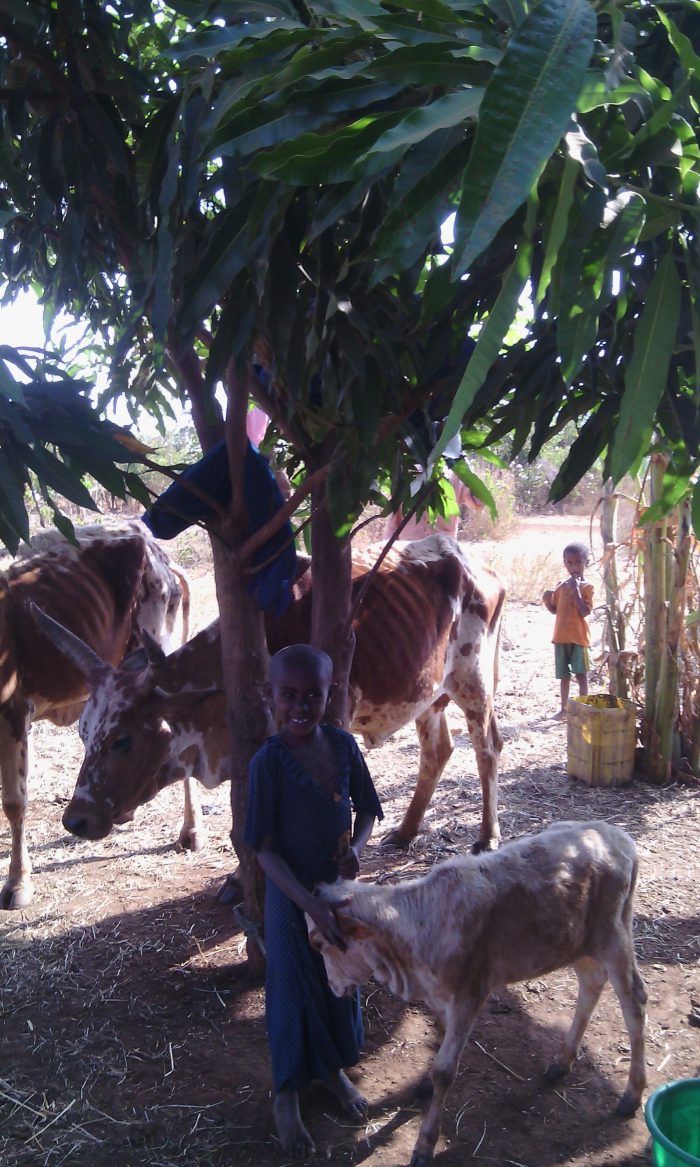
“This is my cattle in my compound. In the past there used to be free grazing land. Now we have to feed the animals at home. It is difficult because there is shortage of fodder. I joined the ‘Amhara Credit and Saving Institution’ (ACSI) and I borrowed money to rent land and to pay a daily laborer for weeding. But I do not want to borrow any more, because I might end up in debt and I will not be able to pay it back.
In the past I used to have enough milk because there was enough fodder. Both during the dry and the raining season. Now there is only enough milk during the raining season. The rest of the year, the grass is dry. My wife used to prepare and sell butter. Now we do not have enough milk.
In the past I used to feed the cattle with peanuts and soya bean shells. But now that I farm land in Region 6 I cannot transport the shells here. But if the government says that cattle is not important, we have no choice. But rearing animals is good: the price for a good ox is 10,000 birr. That’s why I would like to focus on cattle, if grazing land were given to us.”
How is Alemitu, Yesalam’s wife, adapting to the new life conditions and the new job of her husband?
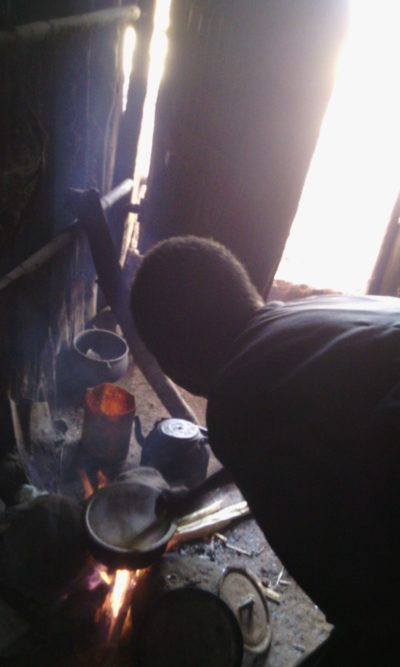
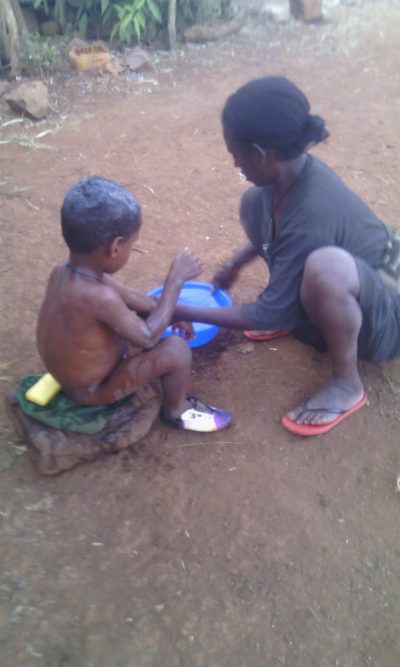
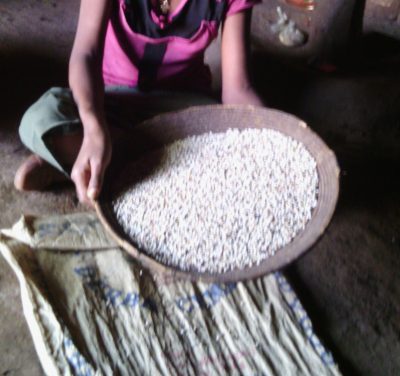
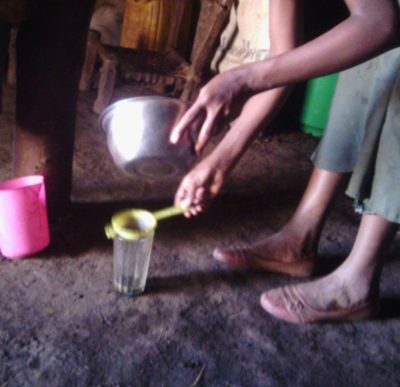
“In this photo I am preparing a local alcoholic drink called areke. I also prepare tella, the local beer. I sell these drinks. I started to do it because I saw that also others were doing this to earn some money. Preparing areke once might take almost twenty days. I used grain such as bobe (millet) and a herb known as gesho. To start this small business I spent 600 birr to buy some tools such as cups. I started this business to assist my husband to cover our household expenses. Before we settled in this new place I used to be involved in weeding. However, last year since my husband was farming far away, I was not able to assist him. I could not go there and leave the children here. That’s why I started to prepare and sell local drinks and tea. Before I used to prepare local drinks only for holidays for the family and our guests. The profit I get from areke is not that much, but at least it helps me to cover some household expenses.
In the other picture I am taking care of my children. I have a water well in the compound so water it is not a problem. I can wash my kids properly. In the previous house we were fetching water from the river. Now we have good access to water, which is good for personal hygiene. I have five children and two relatives’ children living with us. Feeding all of them properly is a challenge. I am worried. I also worry about education material and clothes. Before being displaced we were buying clothes for all the family after the harvest. But now we do not have money as in the past and we can only buy some clothes turn by turn, whenever we get some money. Before being displaced my children were getting milk and other foods, but after displacement the amount and the quality of food have reduced. For example, in the past we had bee hives, which produced honey. So, we were eating honey, eggs, milk and dairy products.
In this other picture my niece is preparing bobe (millet) for grinding. We use the flour to bake injera. My niece is also my neighbour. Sometimes she assists me in domestic works, when there is a school break. After displacement bobe became our main food because we do not produce any more maize, dagusa, spinach, sesame… We can grow only bobe because the new land we got is very rocky. We are afraid that other crops might fail. The problem with bobe is that unless it is washed and dried very well, it gets spoiled after some time. Also in terms of nutrition, dagusa is better, like teff. With dagusa you can stay the rest of the day without eating, but with bobe you get hungry rather soon.
In the final picture my niece is purifying tella. In the past, when there was a holiday we used to have a lot of guests in our house. We used to slaughter a goat and to prepare local drinks. Now we do not slaughter any more, and we do not always prepare these drinks. Since we have less cattle and less land, and the land is less productive, during holidays we do not invite people any more. We invite only a few relatives.

